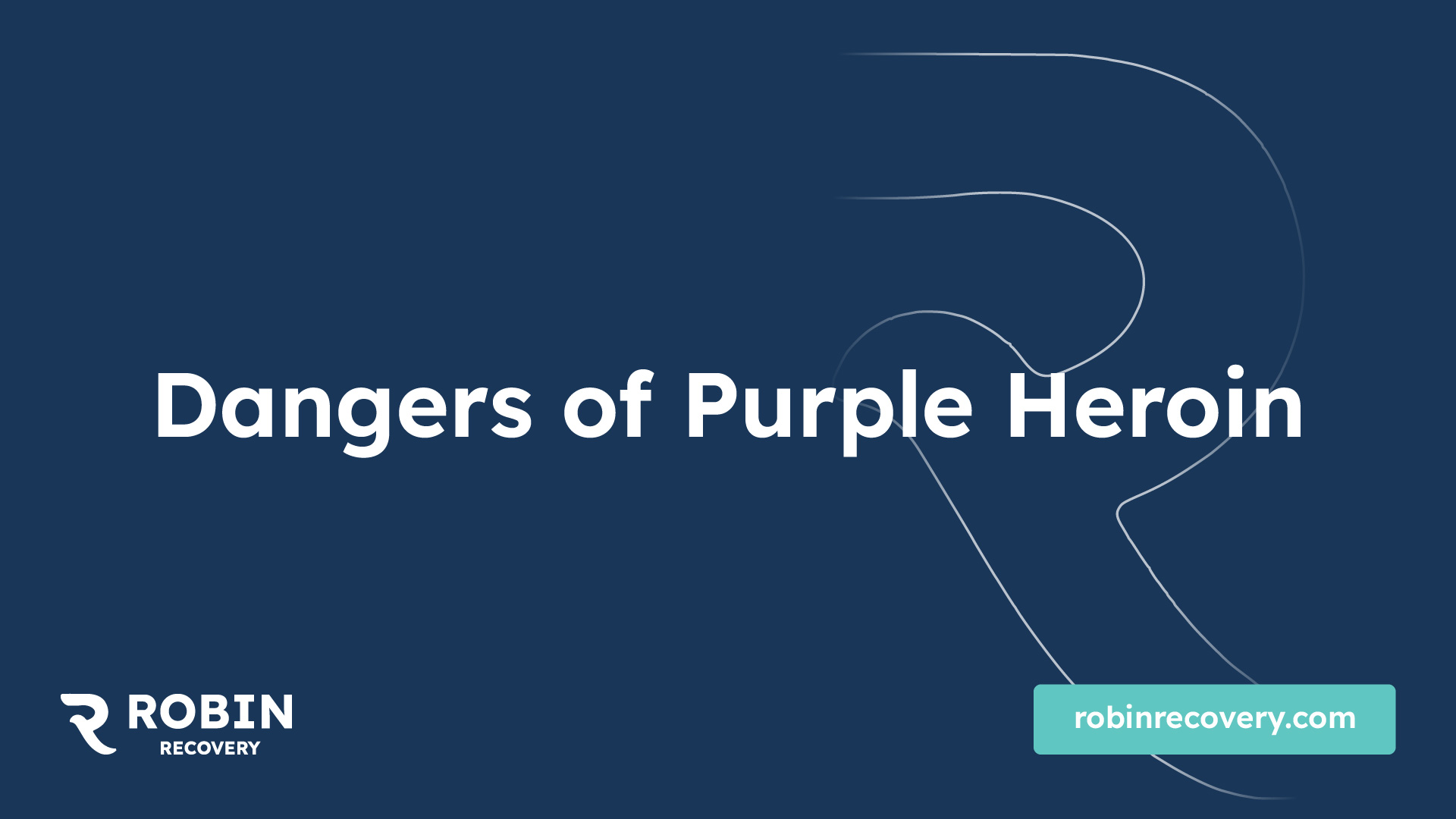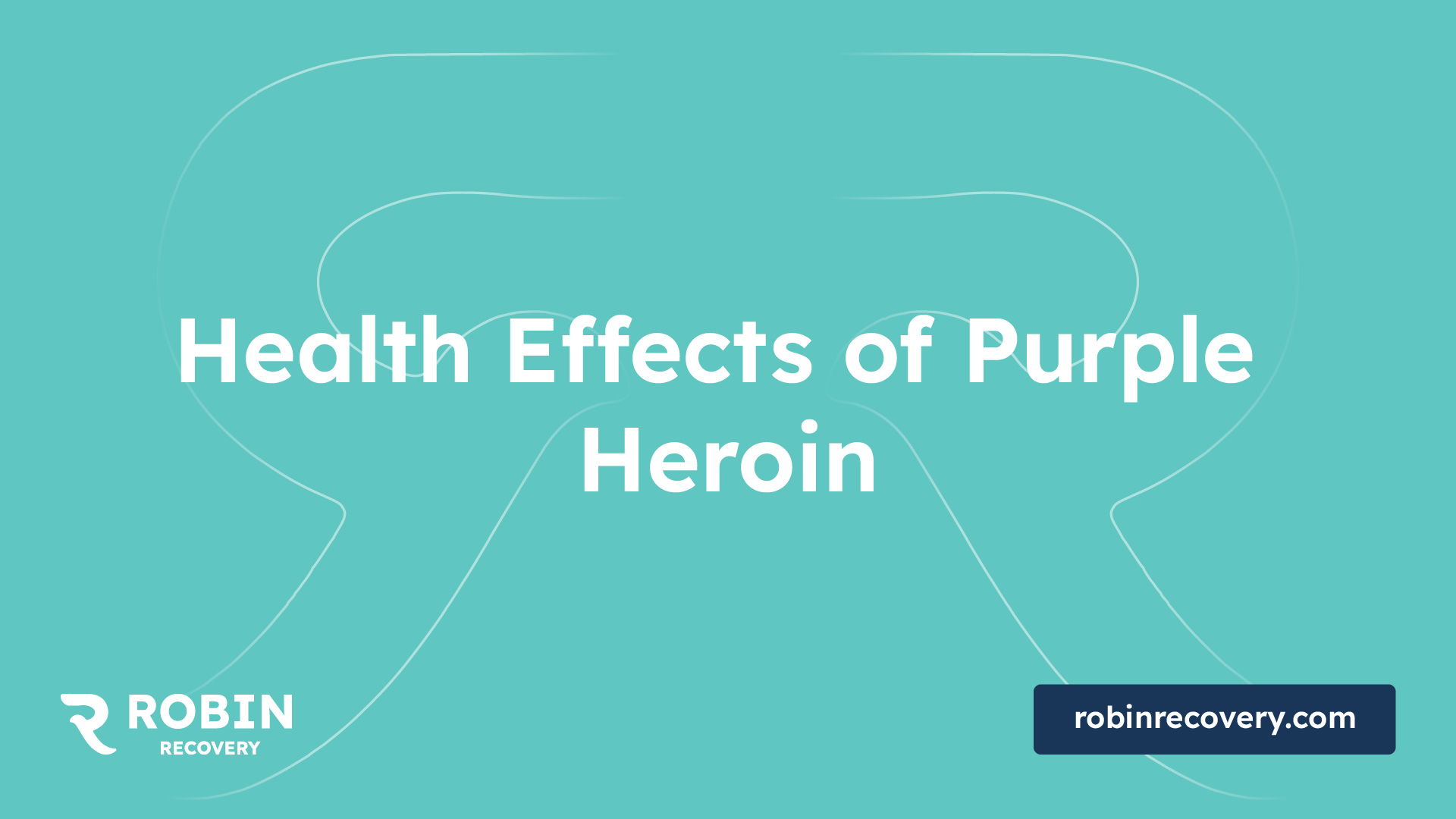Confronting the Purple Peril: The Hidden Dangers of Purple Heroin


Understanding Purple Heroin
Introduction to Purple Heroin
Purple heroin, a street name for a type of heroin that is distinctively purple in color, poses serious dangers to individuals who use it. The exact reason for the purple color of this illicit drug remains uncertain, but it is believed to be a marketing strategy to distinguish it in the illicit drug market [1]. Purple heroin is a deadly concoction that combines heroin with powerful synthetic opioids, such as fentanyl or carfentanil, along with other substances. The addition of these synthetic opioids significantly increases the potency of the drug, making it extremely dangerous.
Origin and Composition
Purple heroin derives its name from the distinct purple color it exhibits. However, the purple color is believed to be a marketing ploy rather than the actual color of the added drugs. The exact reason for the purple color of heroin remains uncertain [3].
Purple heroin is often laced with synthetic opioids, such as fentanyl or carfentanil, which are significantly stronger than heroin itself. These synthetic opioids are many times more potent than heroin, increasing the risk of overdose and death [2]. The addition of these potent synthetic opioids makes purple heroin a highly dangerous substance.
To better understand the dangers associated with purple heroin, it is important to recognize the risks of lacing and additives, as well as the potential for overdose. These aspects are explored in the subsequent sections of this article.

Dangers of Purple Heroin
When it comes to purple heroin, there are significant dangers associated with its use. Understanding these risks is essential for individuals and communities in order to address the harmful effects of this dangerous drug. Two primary concerns related to purple heroin are lacing and additives, as well as the increased risks of overdose.
Lacing and Additives
Purple heroin is often laced with various substances, including synthetic opioids like fentanyl, as well as other drugs such as acetaminophen, caffeine, and powerful painkillers. This combination of different substances poses serious dangers and increases the risk of overdose and death. The composition of purple heroin can vary as it is often mixed with different chemicals and substances, with the inclusion of synthetic opioids like fentanyl increasing the drug's potency and posing significant risks to individuals who use it [1].
Mixing multiple opioids, including purple heroin, can have additive effects on the body, intensifying the risks and dangers associated with their use. The combination of heroin and synthetic opioids, such as fentanyl, increases the potency and potential for overdose, making purple heroin an even greater threat to the health and well-being of individuals who use it [1]. The presence of fentanyl in the heroin supply poses significant risks to individuals using purple heroin, as fentanyl is extremely potent and even small amounts can lead to overdose and death. Its inclusion in purple heroin makes the drug more unpredictable and increases the likelihood of a fatal overdose [1].
Risks of Overdose
The risks of overdose associated with purple heroin are particularly high due to the presence of potent synthetic opioids like fentanyl. These synthetic opioids are many times more potent than heroin itself, significantly increasing the risk of overdose and death [2]. Even a small amount of fentanyl in purple heroin can have devastating consequences. The inclusion of fentanyl in the heroin supply makes purple heroin more dangerous and unpredictable, as users may unknowingly consume a lethal dose.
It is crucial to raise awareness about the dangers of purple heroin and the risks associated with its use. Education, prevention, and access to effective treatment are essential in combating the harmful effects of this deadly substance. If you or someone you know is struggling with heroin addiction or is at risk of overdose, seeking help from medical professionals and support services can be a life-saving step.

Health Effects of Purple Heroin
Purple heroin, often laced with a variety of substances including synthetic opioids like fentanyl, poses serious health risks and side effects. The physical impact and mental health consequences associated with purple heroin use can be severe and long-lasting.
Physical Impact
The use of purple heroin can have various physical effects on the body. Some of the commonly observed physical impacts include:
Mental Health Consequences
Purple heroin use can also have significant mental health consequences. Some of the mental health effects associated with purple heroin use include:
It's important to note that the long-term effects of purple heroin use can be even more severe. Prolonged use of this drug can lead to addiction, overdose, infectious diseases (such as HIV and hepatitis C), respiratory issues, liver and kidney damage, cognitive impairment, relationship problems, and legal and financial issues [2].
If you or someone you know is struggling with purple heroin addiction, seeking comprehensive treatment and ongoing support is crucial to overcoming this chronic and relapsing condition. Recovery from purple heroin addiction requires a personalized treatment plan that addresses the physical, psychological, and social aspects of addiction. Consider reaching out to a healthcare professional or addiction specialist for guidance and support.
Addiction and Dependency
Purple heroin addiction is a chronic and relapsing condition that requires comprehensive treatment and ongoing support to overcome. The potent nature of purple heroin, combined with its highly addictive properties, makes it easy for individuals to develop a dependency on the drug. Over time, individuals may experience cravings and a loss of control over their drug use, leading to addiction.
Chronic Nature of Addiction
Purple heroin addiction is characterized by its chronic nature. It is a complex disease that affects the brain and behavior, leading to compulsive drug-seeking and use. Once an individual becomes addicted to purple heroin, seeking and using the drug often becomes their primary focus in life. The powerful grip of addiction can make it challenging for individuals to quit using the drug, even when they are aware of the negative consequences.
Treatment and Recovery Options
Thankfully, there are effective treatment and recovery options available for individuals struggling with purple heroin addiction. It is important to seek professional help and support to address the physical, psychological, and social aspects of addiction. Treatment for purple heroin addiction typically involves a combination of medication and behavioral therapy.
Medications can play a crucial role in the treatment of heroin use disorder. They work by reducing drug cravings and withdrawal symptoms, improving the chances of achieving abstinence. The choice of medication is tailored to an individual's recovery needs, taking into consideration co-occurring health conditions. When combined with behavioral therapy, these medications offer hope to individuals with substance use disorders [5].
Behavioral therapy is an essential component of addiction treatment. It helps individuals understand the underlying causes of their addiction, develop coping mechanisms, and learn healthier ways of managing stress and triggers. Therapy may be provided in individual, group, or family settings, depending on the needs of the individual.
Support groups and aftercare programs can also be beneficial in maintaining long-term recovery. These programs provide ongoing support, encouragement, and accountability to help individuals stay on track with their sobriety goals.
It is important to remember that recovery is a personal journey, and what works for one individual may not work for another. Treatment plans should be tailored to suit the unique needs and circumstances of each person. With the right support and resources, individuals can overcome purple heroin addiction and lead fulfilling, drug-free lives.
Long-Term Effects of Heroin Use
Long-term heroin use can have significant impacts on both the structure and function of the brain. These effects can contribute to the development of tolerance and dependence, which further perpetuate the cycle of addiction.
Brain Structure Changes
Repeated heroin use leads to alterations in the physical structure and physiology of the brain. These changes can cause long-term imbalances in neuronal and hormonal systems that are not easily reversed. One of the areas most affected is the brain's white matter, which is responsible for connecting different regions of the brain and enabling efficient communication.
The deterioration of white matter due to heroin use can have profound consequences on various cognitive functions. Decision-making abilities, behavior regulation, and responses to stressful situations may be impaired. These changes in brain structure can contribute to difficulties in controlling drug use and maintaining healthy relationships and responsibilities in daily life.
Tolerance and Dependence
Heroin use leads to the development of tolerance, wherein the individual requires increasing amounts of the drug to achieve the desired effects. This occurs as the body adapts to the presence of heroin, resulting in diminished responsiveness to the same dose. As tolerance develops, individuals may find themselves needing higher and higher doses to experience the same level of euphoria.
Physical dependence is another consequence of long-term heroin use. The body becomes reliant on the drug to function normally, and the absence of heroin can trigger a range of withdrawal symptoms. These symptoms may include restlessness, muscle and bone pain, insomnia, diarrhea, vomiting, cold flashes, and leg movements. The intensity of withdrawal symptoms can vary depending on the duration and severity of heroin use.
The combination of tolerance and physical dependence can make it challenging for individuals to stop using heroin without experiencing distressing withdrawal symptoms. It is essential to seek professional help and support from addiction treatment services to safely manage withdrawal and begin the journey towards recovery [4].
Understanding the long-term effects of heroin use can shed light on the gravity of this addiction and the importance of seeking timely intervention. If you or someone you know is struggling with heroin addiction, reach out to healthcare professionals, addiction specialists, or local support services to explore treatment options and start the path towards recovery.
Withdrawal and Heroin Use Disorder
Withdrawal from heroin can be a challenging and uncomfortable process, often accompanied by intense physical and psychological symptoms. Additionally, repeated heroin use can lead to the development of heroin use disorder, a condition characterized by uncontrollable drug-seeking behavior despite negative consequences. In this section, we will explore the onset of withdrawal and the implications of heroin use disorder.
Onset of Withdrawal
Withdrawal symptoms from heroin can start within hours of the last dose, with major symptoms peaking between 24-48 hours and subsiding after about a week. However, it's important to note that some individuals may experience persistent withdrawal signs for months. The specific timeline and severity of withdrawal symptoms can vary depending on factors such as the individual's physical health, duration of heroin use, and the amount of heroin consumed.
Common withdrawal symptoms include:
These symptoms can be highly uncomfortable and may contribute to relapse if not properly managed. Seeking professional help, such as addiction treatment programs or medical supervision, is crucial during this phase to ensure a safe and supportive environment for the individual. It's important to note that withdrawal should be undertaken with medical guidance, as complications can arise. For more information on addiction treatment and recovery options, please refer to our section on treatment and recovery options.
Heroin Use Disorder Implications
Heroin use disorder is a common outcome of repeated heroin use. It is characterized by uncontrollable drug-seeking behavior despite negative consequences, such as health issues, strained relationships, legal problems, and difficulties at work or school. The compulsive nature of heroin use disorder makes it challenging for individuals to quit using the drug, even when they are aware of the harmful effects it has on their lives.
To effectively address heroin use disorder, a comprehensive and individualized treatment approach is necessary. This may include a combination of medication-assisted treatment, counseling, behavioral therapies, and support from healthcare professionals. These interventions aim to help individuals manage cravings, address underlying issues that contribute to substance use, and develop healthy coping mechanisms.
It's important to remember that recovery is possible, and seeking help is the first step towards a healthier and drug-free life. If you or someone you know is struggling with heroin use disorder, reach out to a healthcare professional or addiction specialist to explore available treatment options.
Understanding the onset of withdrawal and the implications of heroin use disorder can shed light on the challenges individuals face when trying to overcome heroin addiction. By providing support, access to resources, and evidence-based treatment approaches, we can help individuals navigate their journey towards recovery and improve their overall well-being.
References
[2]:
[3]:
[4]:
[5]:
